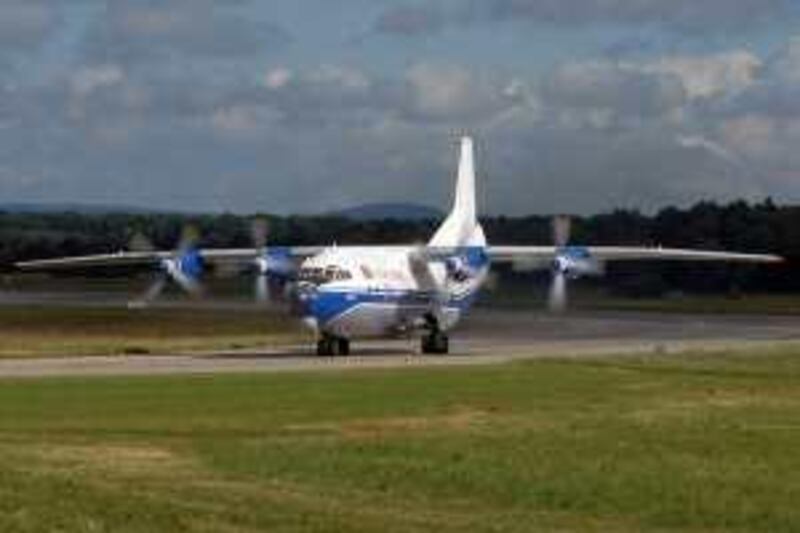FUJAIRAH // More than 45 foreign-registered airlines have been shut or ordered to move their operation base from the UAE since the start of the year, the head of the General Civil Aviation Authority (GCAA) said yesterday. "According to the Chicago Convention they are welcome to operate in our country but not to base their operations in our country because they are registered somewhere else," said Saif al Suwaidi, the authority's director general.
"If they are registered somewhere else and operate in our country, who will be responsible for them? It is very obvious this year that there is a misuse of the open-sky policy." The latest company to be banned is Rubystar, a cargo carrier registered in Belarus that was ordered yesterday to stop operating from Fujairah International Airport. Khaled al Mazroui, general manager of the airport, praised the GCAA efforts to ensure that aircraft entering UAE airspace adhered to safety criteria set by the International Civil Aviation Organisation.
"Lately the GCAA are dealing with things in a very good manner, which was not the case in the past," he said. "It's their job not just to concentrate on a particular type of aircraft or registration. They have to make sure that when aircraft come into UAE they are very safe and meet standards set by the ICAO." Dr al Mazroui said the Fujairah airport had been routinely grounding planes that failed to meet safety standards.
"As an airport authority we have rejected aircraft from operating here for safety reasons without a request from GCAA," he said. He applauded stricter regulations, which he said were long overdue. Some airline operators say, however, that they had permission from the GCAA to operate and were being unfairly targeted. Andrey Malinin, the UAE representative of Rubystar, said his company was given less than 24 hours' notice to stop operating from Fujairah.
His company received permission to fly its two Antonov 12s in May and began daily deliveries to international peacekeeping forces in Afghanistan in September. The contract runs until May, but now its planes cannot use UAE airspace. "They allowed us and our Antonov 12s to operate and they have an open-sky policy," Mr Malinin said. "For this particular plane we have a letter that releases us from the ban."
Yesterday, the Antonovs started on their daily route to Afghanistan, but Mr Malinin received notice mid-morning that the planes could not return to the UAE. "We cannot get clearance to come back so we are parked in Karachi and waiting for any other job," he said. "I cannot see the actual reason why they would stop it. We are not based here; we are using the open sky policy. "We are not facing any problems in Europe. In any country we are welcome."
The expense of having crew and two planes grounded in Karachi represents "a massive amount of money" for the company, but Mr Malinin said the restrictions could also be a big blow to business in the airports of the Northern Emirates. "With takeoff-landing fees, plus the crew accommodation, we are spending about Dh10,000 (US$2,723) daily here," Mr Malinin said. Fujairah handles an average of 60 flights a day by more than 40 operators, 90 per cent of which are cargo-based.
The airport has seen a growth of 30 per cent in the last year, but Mr Malinin warns that if certain types of aircraft are completely banned, like the Antonovs and the Ilyushin Il-76, the airport could lose most of its business. "We do look at it in terms of economic impacts, but at the same time we give a priority to safety and we work hand in hand with the GCAA ," Dr al Mazroui said. "We agreed to have a watch list to consider the airlines and they do come and make surprise inspections. We are stakeholders and we are working with them."
But Mr Malinin said the airlines were not given fair warning. "We have sent an official request from Belorussian government to UAE Government to the head of Civil Aviation to allow us to continue, and we are waiting for his response and to understand what has happened and why it's happened," Mr Malinin said. While he waits, Mr Malinin is hoping to start operations between Karachi and Islamabad. It takes an average of two months to apply to work as a national operator in the UAE.
"We have a list of records and copies of our safety records in Europe," Mr Malinin said. "They have checked us and not found any problems with us, and it's really a high level test. We are just wondering what is going on here. "There is no explanation. We are a legal operator and we can fly anywhere in Europe and the United States." Mr al Suwaidi believes otherwise. "Open sky means that you open your airspace for the operation but of course there are also regulations," he said. "One of the rules is that if they want to base their company in the UAE they have to be a national operator. They are avoiding this because they know how strong we are in oversighting."
@Email:azacharias@thenational.ae






